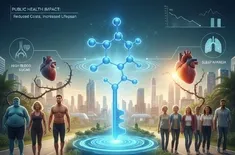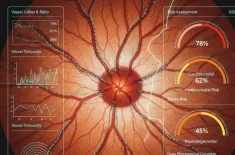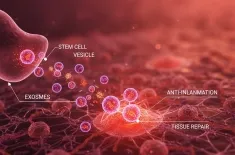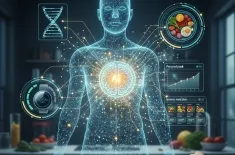A diet is the sum of food and drink that a person regularly consumes. It encompasses all the nutrients and substances an individual takes in to sustain life, support growth, and maintain health. Diets can vary widely based on cultural, personal, or health-related factors, and they play a crucial role in overall well-being and disease prevention.
Diet is a term that often gets tossed around in various contexts, yet it essentially refers to the sum of food consumed by a person or other organism. While many people associate "diet" with temporary or restrictive weight-loss plans, its definition encompasses far more, including everyday eating habits and choices. The term originates from the Greek word "diaita," meaning "way of life," which underlines the idea that a diet is more about lifestyle choices than mere dietary restrictions.
What is Diet and Nutrition?
Diet and nutrition are intertwined concepts that collectively contribute to an individual's overall health and well-being. Nutrition refers to the process by which living organisms obtain and utilize the necessary nutrients from food. A diet that is well-balanced and nutritious provides essential vitamins, minerals, proteins, fats, and carbohydrates required for the body's optimal functioning.
In essence, while the "diet" describes what you eat, "nutrition" highlights the quality and value of those food choices. A nutritious diet supports growth, maintains body tissues, and aids bodily functions. Poor nutrition or an unbalanced diet can lead to a myriad of health issues, including deficiencies, chronic diseases, and decreased cognitive and physical performance.
What is Diet in Science?
In scientific terms, a diet is the habitual consumption of food, which reflects the individual's lifestyle, preferences, and nutritional needs. Scientists study diets to understand the relationships between dietary habits and health outcomes. This includes assessing how different nutrients affect bodily functions and how diet can contribute to the prevention and management of diseases.
Research in this field often examines energy balance, nutrient intake, and biochemical processes dependent on the types of foods consumed. For instance, scientists look at how carbohydrates are metabolized for energy, how proteins are broken down into amino acids for muscle repair, and how fats are processed and stored. By studying these processes, scientists aim to provide evidence-based dietary recommendations that promote health and longevity.
What is Diet in Biology?
From a biological perspective, a diet serves as the source of energy and nutrients necessary for cellular growth, reproduction, and maintenance of homeostasis. Biology examines the role of diet at the cellular and systemic levels, including how nutrients intake supports cellular communication, gene expression, and the functioning of various biological pathways.
For animals and humans alike, their diets must meet energy requirements and provide raw materials for bodily maintenance and repair. Biological studies highlight the importance of dietary diversity to ensure intake of essential amino acids, fatty acids, vitamins, and minerals, which the body cannot synthesize on its own.
What is Diet in Physical Education?
In physical education, diet plays a critical role in enhancing physical performance and promoting recovery. Athletes and individuals engaging in regular physical activities require tailored diets that support endurance, strength, speed, and muscle recovery. Physical educators emphasize the importance of a balanced intake of macronutrients—carbohydrates, proteins, and fats—as well as micronutrients to fuel activity and optimize performance.
Sports nutrition is a specialized area focusing on diets that help to maintain body weight, build muscle mass, and improve athletic endurance. This involves understanding how different foods and nutrients can influence metabolism, recovery times, and performance outputs. Hydration is also an integral part of diet in physical education, as it's vital for maintaining physiological balance and enhancing energy levels during physical exertion.
What is Diet for Kids?
Children's diets are pivotal for their growth, development, and overall health. A diet for kids should be rich in essential nutrients to support brain development, strong bones, and a healthy immune system. Childhood is a crucial time for instilling healthy eating habits that can last a lifetime, and this starts with introducing a variety of nutrient-dense foods.
Key components of a child's diet include high-quality proteins for growth, energy-providing carbohydrates, healthy fats crucial for brain development, calcium for bone health, and iron for cognitive development. Additionally, children should consume plenty of fruits and vegetables to ensure adequate intake of vitamins and fibers. Limiting sugar and processed foods is also important to avoid the risk of childhood obesity and other health issues.
Nutritional Needs at Different Ages
The nutritional needs of children change as they grow. Infants, for instance, require diets high in fats for brain development, whereas teenagers might need increased protein intake to support muscle growth. Diets must be adjusted according to activity levels, growth spurts, and individual health needs.
What is Diet Food?
Diet food refers to foods specially designed or selected to align with particular dietary goals, such as weight loss or health maintenance. These foods are often lower in calories, fats, sugars, and sodium. Diet foods may include items like lean proteins, whole grains, fruits, vegetables, and food products labeled as "low-fat," "sugar-free," or "light."
However, the concept of diet food can sometimes be misleading. It's crucial to evaluate the nutritional value and ingredient list of these foods rather than focusing solely on marketing terms. Whole, minimally processed foods are generally the most beneficial for long-term health, whereas heavily processed diet foods might lack nutritional depth.
What is a Balanced Diet?
A balanced diet refers to consuming the right amounts of a variety of foods, allowing the body to obtain all the essential nutrients it requires for overall health and well-being. This type of diet helps maintain energy levels, supports bodily functions, and reduces the risk of chronic diseases. It typically includes an array of food groups in appropriate proportions, balancing macronutrients and micronutrients.
Components of a Balanced Diet
- Carbohydrates: They are the body's main source of energy and are found in foods such as grains, fruits, vegetables, and legumes. Whole grains and fiber-rich carbohydrates are preferred for sustained energy release and digestive health.
- Proteins: Essential for growth, repair, and maintenance of body tissues, proteins should be sourced from both animal and plant-based foods including meat, fish, eggs, beans, nuts, and seeds.
- Fats: Necessary for absorbing vitamins and providing energy, healthy fats can be obtained from fish, nuts, seeds, avocados, and oils like olive oil. Saturated and trans fats should be minimized.
- Vitamins and Minerals: Vital for various bodily functions, these micronutrients should be obtained from a variety of fruits, vegetables, lean meats, and dairy products.
- Water: Often overlooked, water is essential for digestion, absorption of nutrients, and elimination of waste. Staying hydrated is crucial for maintaining all bodily functions.
Benefits of a Balanced Diet
- Improved Health: A balanced diet promotes healthy growth and development in children and adolescents while reducing the risk of conditions such as obesity, heart disease, diabetes, and cancer.
- Optimal Functioning: Provides essential nutrients that enhance cognitive function, boost energy levels, and improve mood and overall well-being.
- Weight Management: Helps in maintaining a healthy weight by balancing calorie intake with energy expenditure.
Creating a Balanced Diet
To create a balanced diet, consider the following guidelines:
- Diversity: Include a variety of foods from all food groups to ensure comprehensive nutrition.
- Portion Control: Be mindful of portion sizes to manage calorie intake without excess.
- Limit Processed Foods: Reduce consumption of processed foods high in sugars, unhealthy fats, and salt.
- Focus on Whole Foods: Choose whole, minimally processed foods to maximize nutrient intake.
- Regular Meals: Eat at regular intervals to maintain energy levels and avoid overeating.
Conclusion
Understanding what diet encompasses across different contexts highlights its fundamental role in shaping health and lifestyle. From fostering the growth and development of children to enhancing athletic performance and promoting overall well-being, diet is a multifaceted concept integral to life. A balanced diet, in particular, stands as the cornerstone of healthy living, bridging the gap between optimal nutrition and a fulfilling life. By prioritizing a diverse and balanced approach to eating, individuals can better manage their health and enjoy the benefits of improved physical and mental performance.



































